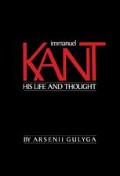Abstract
Years passed. Kant had not published anything in a long time: after the dissertation De mundi sensibilis atque intelligibilis forma et principiis and the two articles about the Philanthropin, there was only the review of Moscati’s book On the Difference in Bodily Structure between Man and Animal and the announcement of his lectures for 1775 (On Different Races of Man). The silence lasted eleven years.
Reason has always existed, just not always in the rational form.
K. Marx
Access this chapter
Tax calculation will be finalised at checkout
Purchases are for personal use only
Preview
Unable to display preview. Download preview PDF.
References
Letter from Johann Caspar Lavater of February 8, 1774 (117).
Kant, Reflexionen 1444, XV.II, p. 630.
Vorländer, Immanuel Kant, p. 250.
Vorländer, Kants Leben, p. 89.
Letter from Abraham Freiherr von Zedlitz of March 28, 1778 (168, f.).
Kant, KrV, B XXXV.
Now and then Kant uses the term “thing in its own right.” Gerhard Prauss says: “‘Thing in itself and thing in its own right’ are merely shortened forms of ‘thing considered in its own right’.” G. Prauss: Kant und das Problem der Dinge an sich, (Bonn, 1974), p. 20.
Kant, KrV, B, p. 334.
Kant, KrV, B, p. 83.
Kant, KrV, B, p. 190.
Kant, KrV, B, p. 85.
Kant, KrV, B, p. 294.
Andrey Bely: Stikhotvorenia i poemi, (Moscow-Leningrad, 1966), p. 307. (Poem “At the Window” from the cycle “Philosophical Melancholy”)
Aleksandr Blok, Sobranie sochineniy, (Moscow-Leningrad, 1960), vol. I, p. 294. (Poem “Immanuel Kant”)
Kant, KrV, B, p. 75.
Kant, KrV, B, p. 80.
Kant, KU, V, p. 197, note.
Kant, KrV, B, p. 108.
Kant, Prolegomena & 36, IV, p. 320.
Jacques Salomon Hadamard, The Psychology of Invention in the Mathematical Field, (n.p., 1945).
Kant, Reflexionen 177, XV.I, p. 65f.
Kant, KrV, B, p. 152.
Kant, KrV, B, p. 167.
Kant, KrV, B, p. 172.
Kant, KrV, B, p. 353.
Y.F. Golosovker, Dostoevsky i Kant, (Moscow, 1963), p. 36.
Kant, Prolegomena & 52, IV, p. 339.
Kant, KrV, B, p. 583.
Letter to Christian Garve of September 21, 1798 (780).
Blok, Sobranie sochineniy, (Moscow, 1971), vol. VII, p. 46.
F.M. Dostoevsky, Polnoe sobranie sochineniy, (Moscow, 1973), vol. VII, p. 161.
Golosovker, Dostoevsky i Kant, p. 87.
Heinrich Heine, “Zur Geschichte der Religion und Philosophie in Deutschland”, in, Sämtliche Schriften, (München, 1971), vol. III, pp. 594–596.
Kant, KrV, B, p. 658.
Kant, KrV, B, p. 664.
Heine, op. cit., vol. III, p. 604.
Kant, KrV, B, XXX.
Kant’s play on words gets lost in the translation. Cf, I must therefore abolish knowledge in order to make room for belief, Critique of Pure Reason, n.tr., (London, 1930) p. XXX. Or: Je davais donc abolir la science pour faire place a la foi, Critique de la raison pure par Kant, n.tr. (Paris, 1864), vol. I, p. 22. The Russian translator uses either ‘unichtozhit’ (annihilate), or ‘ogranichit’ (limit). That is not a translation, but an interpretation.
106a. Why did Kant play with words? Kant was openly ironic. In the same paragraph Kant says that one must avail oneself of the inestimable advantage of eliminating all objections by the use of “the Socratic method, namely by proving conclusively and clearly the untenability of the opposite proposition”. (B XXXI) The “Socratic method” entails the use of irony. If one does not grasp the many-sidedness of Kant’s proposition, a false understanding ensues. Korff recalls the famous sentence and interprets Kantian philosophy as a “rationalistic justification of irrationalism”. (H.A. Korff, Geist der Goethezeit, (Leipzig, 1955), vol. II, p. 89)
But Vorländer had already referred to the “indeed ambiguous proposition”. (Vorländer, Kants Leben, p. 159.)
Kant, KrV, B, p. 852.
Kant, KrV, B, p. 857.
Kant, KrV, B, p. 878.
Kant, Prolegomena & 52 b. IV, p. 340.
For reactions to the publication of the Critique of Pure Reason see, Ein Jahrhundert deutscher Literaturkritik, vol. III, Der Aufstieg zur Klassik in der Kritik der Zeit, n.ed., (Berlin, 1959), pp. 310–356; Herder to Hamann, p. 315.
Letter from Johann Heinrich Kant with postscript by his wife of September 10, 1782.
Letter to Christian Garve of August 7, 1783 (232).
ibid., (228).
Cf., Prolegomena, IV, p. 374, ff.
Kant, Idee zu einer allgemeinen Geschichte in weltbürgerlicher Absicht, (The Idea of a Universal History from a Cosmopolitan Point of View) VIII, p. 468.
Rights and permissions
Copyright information
© 1987 Birkhäuser Boston Inc.
About this chapter
Cite this chapter
Gulyga, A. (1987). The Self-Critique of Reason. In: Immanuel Kant. Birkhäuser Boston. https://doi.org/10.1007/978-1-4684-0542-2_3
Download citation
DOI: https://doi.org/10.1007/978-1-4684-0542-2_3
Publisher Name: Birkhäuser Boston
Print ISBN: 978-1-4684-0544-6
Online ISBN: 978-1-4684-0542-2
eBook Packages: Springer Book Archive

